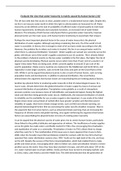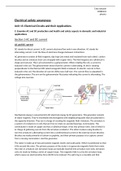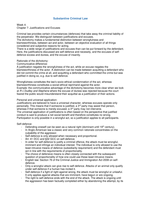GCE Health and Social Care: Unit A2 7: Human Nutrition and Health.
Nutrients in food:
Demonstrate knowledge and understanding of the dietary functions and
sources of protein, carbohydrates and fats:
Proteins are needed for growth, development and repair as they are the building
blocks of the body and a basic structure of hair, skin and muscles. Proteins help to
repair damaged cells and help to recover quickly from illness. They act like a second
source of energy and produce enzymes to aid digestion and hormones to help
regulate the body.
HBV: high biological value proteins come from animal sources: fish, eggs, red meat.
LBV: low biological value proteins come from plant sources: pulses, beans and tofu,
but they lack one or more of essential indispensable amino acids thus HBV and LBV
should be mixed together for a healthy, balanced diet.
Carbohydrates should make 50% of the diet as they are the main source of energy,
they also act as protein sparer so proteins can do their job. Carbohydrates are
important in diet as they are high in fibre which aids digestion, prevents constipation
and bowel diseases such as cancer. However, too much carbs can lead to obesity.
Complex carbs release energy slowly, helping people to feel fuller and simple carbs
release energy much quicker.
Sugars: extrinsic - added sugars such as table sugar and intrinsic sugars are found
naturally in fruits and honey. NSP: nsp cannot be digested but is important for
digestion, found in: green leafy vegetables, nuts, potatoes and grains. Starches take
longer to digest: grains, pasta, rice, cereals, fruits and vegetables.
Fats help to insulate the body and to protect vital organs. They are also a source of
energy and essential fat-soluble vitamins: A,D,E,K. They provide essential omega 3
and omega 6 fatty acids that support joints, bones and heart.
Unsaturated fats come from vegetables and are healthy. (avocado, olive oil)
Saturated fats come from animals and aren't healthy as they convert fat into
cholesterol in the blood increasing risk of stroke or heart diseases. (meat, dairy,
eggs, butter)
, Demonstrate knowledge and understanding of the dietary functions and
sources of water soluble vitamins (B1, B12 and C) and fat soluble vitamins (A,
D, E and K);
B1: essential for proper nerve functioning, releases energy from fats and
carbohydrates and is essential for development. Found in eggs, potatoes.
B12: needed for release of energy from fats and proteins, it's essential for proper
nerve functioning and healthy metabolism, it's also needed for formation of red blood
cells and helps prevent anaemia. Found in milk, seaweed.
Vitamin C: Helps to boost up the immune system so prevent risk of illness, helps to
absorb iron and is vital for wound healing and maintaining connective tissue. Found
in oranges, lemons, strawberries.
Vitamin A: provides the body with resinol which is good for skin, helping to improve
vision, especially at night. Is found in carrots. Having antioxidants thus helps to
decrease risk of some kinds of cancers.
Vitamin D: should be consumed with calcium as it helps it to be absorbed, important
for healthy and strong bones and needed for development and growth, helps broken
bones to heal quicker. Found in fish and eggs.
Vitamin K: activates bone specific protein which helps calcium to be bind to the
bone, helps blood clotting and is wound in milk and wholegrains.
Vitamin E: an antioxidant, protects the body's tissue from damage and is important
for formation of red blood cells, found in wheat and sunflower seeds.
Demonstrate knowledge and understanding of the dietary functions and
sources of minerals (calcium, fluorine and iron):
Calcium: is needed for strong and healthy bones and teeth so they don’t break
easily. Is found in dairy products and is necessary for normal function of muscle and
nerves, also essential for blood clotting.
Fluorine: found in toothpaste with fluorine and drinking water. Helps to keep teeth
strong, healthy and clean as it builds up resistance against bacteria found in the
mouth, thus preventing tooth decay. It maintains bone structure and is needed for
formation of teeth and bones.
Iron: is essential for growth and development, it is also essential for women that
menstruate and vegans as they don’t eat meat. Iron is needed for formation of red
Nutrients in food:
Demonstrate knowledge and understanding of the dietary functions and
sources of protein, carbohydrates and fats:
Proteins are needed for growth, development and repair as they are the building
blocks of the body and a basic structure of hair, skin and muscles. Proteins help to
repair damaged cells and help to recover quickly from illness. They act like a second
source of energy and produce enzymes to aid digestion and hormones to help
regulate the body.
HBV: high biological value proteins come from animal sources: fish, eggs, red meat.
LBV: low biological value proteins come from plant sources: pulses, beans and tofu,
but they lack one or more of essential indispensable amino acids thus HBV and LBV
should be mixed together for a healthy, balanced diet.
Carbohydrates should make 50% of the diet as they are the main source of energy,
they also act as protein sparer so proteins can do their job. Carbohydrates are
important in diet as they are high in fibre which aids digestion, prevents constipation
and bowel diseases such as cancer. However, too much carbs can lead to obesity.
Complex carbs release energy slowly, helping people to feel fuller and simple carbs
release energy much quicker.
Sugars: extrinsic - added sugars such as table sugar and intrinsic sugars are found
naturally in fruits and honey. NSP: nsp cannot be digested but is important for
digestion, found in: green leafy vegetables, nuts, potatoes and grains. Starches take
longer to digest: grains, pasta, rice, cereals, fruits and vegetables.
Fats help to insulate the body and to protect vital organs. They are also a source of
energy and essential fat-soluble vitamins: A,D,E,K. They provide essential omega 3
and omega 6 fatty acids that support joints, bones and heart.
Unsaturated fats come from vegetables and are healthy. (avocado, olive oil)
Saturated fats come from animals and aren't healthy as they convert fat into
cholesterol in the blood increasing risk of stroke or heart diseases. (meat, dairy,
eggs, butter)
, Demonstrate knowledge and understanding of the dietary functions and
sources of water soluble vitamins (B1, B12 and C) and fat soluble vitamins (A,
D, E and K);
B1: essential for proper nerve functioning, releases energy from fats and
carbohydrates and is essential for development. Found in eggs, potatoes.
B12: needed for release of energy from fats and proteins, it's essential for proper
nerve functioning and healthy metabolism, it's also needed for formation of red blood
cells and helps prevent anaemia. Found in milk, seaweed.
Vitamin C: Helps to boost up the immune system so prevent risk of illness, helps to
absorb iron and is vital for wound healing and maintaining connective tissue. Found
in oranges, lemons, strawberries.
Vitamin A: provides the body with resinol which is good for skin, helping to improve
vision, especially at night. Is found in carrots. Having antioxidants thus helps to
decrease risk of some kinds of cancers.
Vitamin D: should be consumed with calcium as it helps it to be absorbed, important
for healthy and strong bones and needed for development and growth, helps broken
bones to heal quicker. Found in fish and eggs.
Vitamin K: activates bone specific protein which helps calcium to be bind to the
bone, helps blood clotting and is wound in milk and wholegrains.
Vitamin E: an antioxidant, protects the body's tissue from damage and is important
for formation of red blood cells, found in wheat and sunflower seeds.
Demonstrate knowledge and understanding of the dietary functions and
sources of minerals (calcium, fluorine and iron):
Calcium: is needed for strong and healthy bones and teeth so they don’t break
easily. Is found in dairy products and is necessary for normal function of muscle and
nerves, also essential for blood clotting.
Fluorine: found in toothpaste with fluorine and drinking water. Helps to keep teeth
strong, healthy and clean as it builds up resistance against bacteria found in the
mouth, thus preventing tooth decay. It maintains bone structure and is needed for
formation of teeth and bones.
Iron: is essential for growth and development, it is also essential for women that
menstruate and vegans as they don’t eat meat. Iron is needed for formation of red





